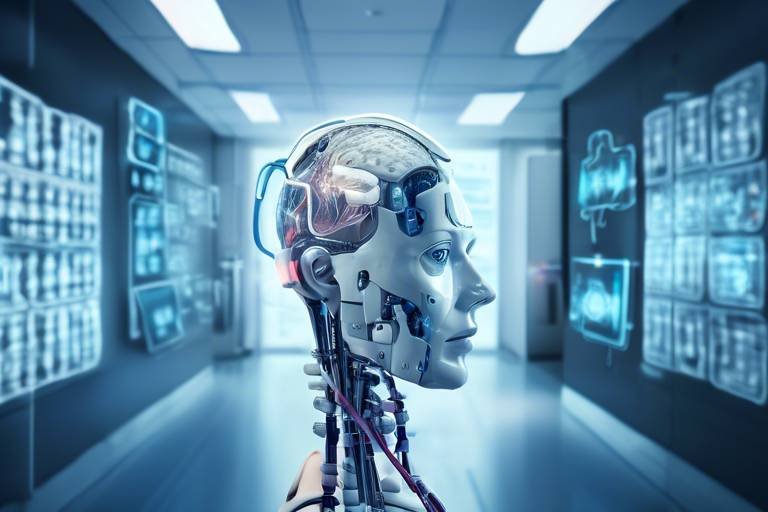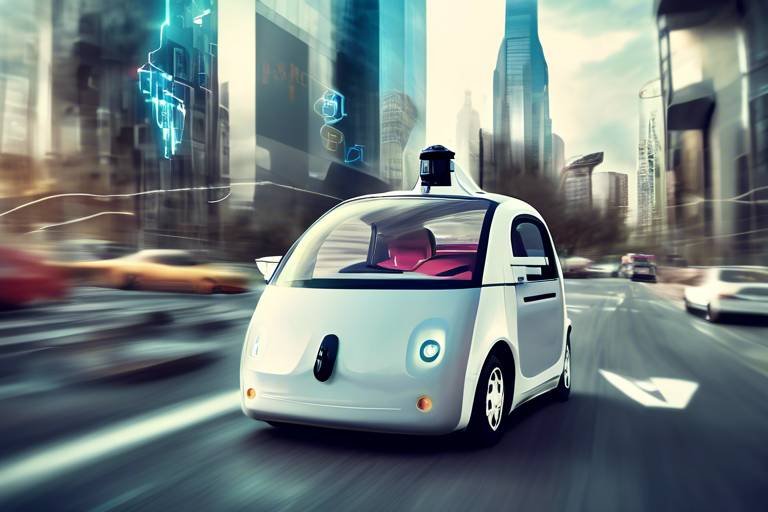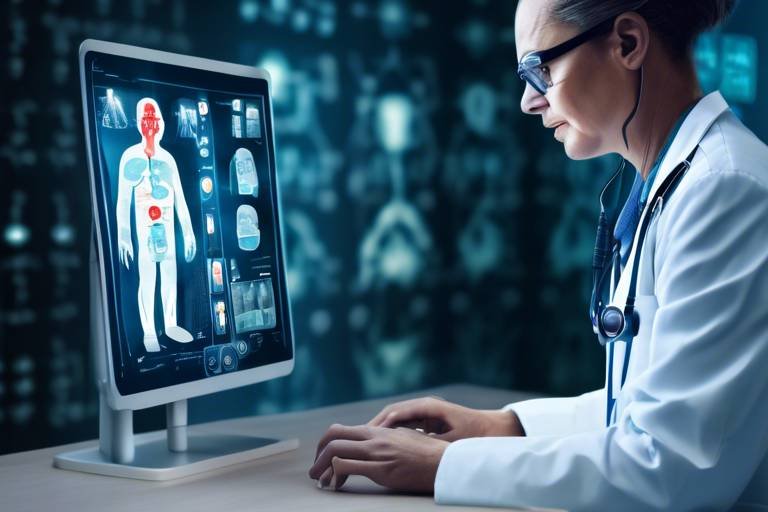Artificial Intelligence: Redefining the Healthcare Experience
In recent years, artificial intelligence (AI) has emerged as a game-changer in the healthcare industry, fundamentally altering how medical professionals deliver care and how patients experience treatment. Imagine walking into a hospital where machines not only assist doctors but also enhance the entire healthcare process, making it more efficient and tailored to individual needs. This transformation is not just a figment of our imagination; it is happening right now. AI is revolutionizing the way we approach healthcare, from diagnostics to patient monitoring, and even in the realm of personalized medicine. The integration of these advanced technologies is paving the way for improved patient outcomes, streamlined operations, and a more satisfying healthcare experience overall.
One of the most exciting aspects of AI in healthcare is its ability to analyze vast amounts of data at lightning speed. Think about it: every day, healthcare providers generate an overwhelming amount of data, from patient records to lab results. AI systems can sift through this information, identifying patterns and insights that may elude even the most experienced practitioners. This capability not only enhances diagnostic accuracy but also allows for earlier detection of diseases, ultimately leading to better patient outcomes. In a world where time is often of the essence, AI is stepping in to ensure that no detail is overlooked.
Furthermore, the concept of personalized medicine is gaining traction thanks to AI. This innovative approach tailors treatments to the unique genetic makeup and health history of individual patients. Imagine receiving a treatment plan that is specifically designed for you, rather than a one-size-fits-all solution. This level of customization is made possible through machine learning algorithms that analyze patient data and predict responses to various therapies. As a result, patients experience not only more effective treatments but also a higher level of satisfaction with their care.
However, as we embrace the potential of AI in healthcare, we must also consider the ethical implications that come with it. Issues such as data privacy, algorithm bias, and the reliance on technology for critical health decisions are crucial topics that need to be addressed. For instance, as AI systems collect sensitive patient data, ensuring privacy and security becomes paramount. Patients must trust that their information is handled with the utmost care, and healthcare providers must comply with legal regulations to protect this data. Moreover, it is essential to tackle algorithm bias to ensure equitable healthcare delivery across diverse demographic groups.
Looking ahead, the future of AI in healthcare is bursting with potential. Ongoing research and development aim to enhance the integration of AI technologies, leading to innovative applications such as robotic surgery and virtual health assistants. These advancements promise to transform traditional healthcare practices, providing new solutions to complex medical challenges. The collaboration between AI technologies and healthcare professionals will be vital in harnessing the full potential of AI, ensuring that human expertise complements technological advancements for optimal patient care.
In conclusion, the impact of artificial intelligence on the healthcare experience is profound and far-reaching. As we continue to explore the possibilities that AI offers, we can look forward to a future where healthcare is not only more efficient but also more personalized and accessible. The journey is just beginning, and the potential for AI to redefine healthcare is limited only by our imagination.
- What is the primary role of AI in healthcare? AI enhances diagnostic accuracy, personalizes treatment plans, and improves patient monitoring.
- How does AI contribute to personalized medicine? AI analyzes individual patient data to tailor treatments based on their unique genetic makeup and health history.
- What are the ethical concerns surrounding AI in healthcare? Key concerns include data privacy, algorithm bias, and the reliance on technology for critical health decisions.
- What is the future of AI in healthcare? The future promises advancements such as robotic surgery and virtual health assistants, enhancing patient care and operational efficiency.

The Role of AI in Diagnosis
Artificial Intelligence (AI) is making waves in the healthcare industry, particularly in the realm of diagnosis. Imagine a world where machines can analyze vast amounts of medical data faster than a human can flip through a textbook. This is not science fiction; it's happening right now! AI technologies are improving diagnostic accuracy by leveraging complex algorithms that sift through patient records, lab results, and imaging studies. By identifying patterns that may be overlooked by human practitioners, AI is paving the way for earlier detection of diseases, which is crucial for effective treatment.
For instance, AI systems can analyze thousands of medical images in mere seconds, highlighting anomalies that a radiologist might miss. This capability is particularly beneficial in fields such as oncology, where early detection of tumors can significantly alter treatment outcomes. A study published in a leading medical journal found that AI-assisted diagnostic tools improved the accuracy of breast cancer detection by over 20% compared to traditional methods. This showcases how AI can not only enhance diagnostic precision but also save lives.
Moreover, AI doesn't just stop at identifying conditions; it also helps in predicting patient outcomes. By analyzing historical data, AI can forecast how a patient might respond to a particular treatment, enabling healthcare providers to tailor their approach accordingly. This predictive capability is especially valuable in chronic disease management, where understanding a patient's trajectory can lead to more personalized care plans.
To illustrate the impact of AI on diagnostics, consider the following table that summarizes the key benefits:
| Benefit | Description |
|---|---|
| Increased Accuracy | AI algorithms can analyze complex data sets to identify conditions that may be missed by human eyes. |
| Early Detection | AI technologies facilitate earlier diagnosis, which is crucial for effective treatment and better patient outcomes. |
| Predictive Analytics | AI can help predict patient responses to treatments, allowing for more personalized care plans. |
But let's not forget about the human element. While AI is a powerful tool, it’s essential for healthcare professionals to interpret the results and make informed decisions. The collaboration between AI systems and human expertise creates a robust diagnostic framework that enhances overall patient care. Think of AI as a highly skilled assistant that can process information at lightning speed, while healthcare providers bring the compassion, intuition, and ethical considerations that only humans can provide.
In conclusion, the role of AI in diagnosis is not just about replacing human effort; it's about augmenting it. By harnessing the power of AI, we can achieve a healthcare system that is more accurate, efficient, and responsive to patient needs. As we continue to embrace these technologies, the future of diagnosis looks brighter than ever!
- How does AI improve diagnostic accuracy? AI analyzes large datasets to identify patterns and anomalies that may be missed by healthcare professionals.
- Can AI replace doctors in diagnosis? No, AI is designed to assist healthcare providers, not replace them. Human expertise is crucial for interpreting results and making ethical decisions.
- What are the limitations of AI in diagnosis? AI systems require high-quality data to function effectively, and there are concerns regarding data privacy and algorithm bias.

AI in Personalized Medicine
In recent years, the healthcare landscape has seen a remarkable shift towards personalized medicine, a revolutionary approach that tailors medical treatment to the individual characteristics of each patient. At the heart of this transformation is artificial intelligence (AI), which harnesses vast amounts of data to create customized treatment plans that consider a patient's unique genetic makeup, lifestyle, and medical history. Imagine a world where your doctor knows not just your symptoms but also how your body is likely to respond to different medications; that's the future AI is helping to build.
One of the most exciting aspects of AI in personalized medicine is the use of machine learning algorithms. These sophisticated tools analyze complex datasets, including genetic information and clinical records, to uncover patterns that might not be immediately obvious to human practitioners. For instance, an AI algorithm can evaluate thousands of genetic variants to predict how a patient will respond to a specific drug, leading to more effective therapies. This isn't just a theoretical concept; it's happening now, and it’s changing lives.
Moreover, the integration of AI in personalized medicine allows for real-time adjustments to treatment plans. As patients undergo treatment, their responses can be continuously monitored through AI-driven platforms. This means that if a particular therapy isn't working as expected, adjustments can be made swiftly, ensuring that patients receive the most effective care possible. It’s like having a personal health assistant who is always on the lookout for the best options tailored just for you!
To illustrate the impact of AI in personalized medicine, consider the following table, which highlights some key benefits:
| Benefit | Description |
|---|---|
| Increased Accuracy | AI analyzes complex data to identify the most effective treatments for individual patients. |
| Enhanced Patient Engagement | Patients become active participants in their own care, leading to improved adherence to treatment plans. |
| Cost-Effectiveness | By predicting the most effective therapies, AI can help reduce unnecessary treatments and hospitalizations. |
| Better Outcomes | Personalized approaches lead to improved health outcomes and higher patient satisfaction. |
Additionally, AI's role in personalized medicine extends beyond just treatment. It also plays a crucial part in preventive care. By analyzing a patient’s risk factors, AI can help healthcare providers recommend lifestyle changes or preventive measures tailored to the individual. This proactive approach not only helps in avoiding diseases but also fosters a culture of health awareness among patients.
In conclusion, AI in personalized medicine is not just a trend; it's a profound shift in how we approach healthcare. By leveraging technology to understand the intricacies of each patient’s health, we are moving towards a more effective, efficient, and patient-centered healthcare system. As we continue to explore the possibilities, the future looks promising—where healthcare is as unique as each individual it serves.
- What is personalized medicine? Personalized medicine is an approach to patient care that tailors treatment based on individual characteristics, including genetics, environment, and lifestyle.
- How does AI contribute to personalized medicine? AI analyzes large datasets to identify patterns and predict how patients will respond to specific treatments, allowing for more effective and individualized care.
- Are there risks associated with AI in healthcare? Yes, there are concerns regarding data privacy, algorithm bias, and the need for human oversight in critical health decisions.
- What is the future of AI in healthcare? The future promises further advancements in AI applications, leading to improved patient care, innovative treatment options, and enhanced efficiency in healthcare delivery.

Machine Learning Algorithms
Machine learning algorithms are at the heart of the AI revolution in healthcare, acting like a sophisticated detective that sifts through mountains of medical data to uncover hidden patterns and insights. Imagine having a tool that can analyze thousands of patient records, lab results, and treatment histories in mere minutes—this is precisely what machine learning does! By utilizing these algorithms, healthcare providers can make predictions about patient outcomes, tailor treatments to individual needs, and ultimately improve the quality of care.
One of the most exciting aspects of machine learning in healthcare is its ability to learn from data over time. As these algorithms are exposed to more information, they become increasingly accurate in their predictions. For instance, consider a scenario where a machine learning model analyzes data from patients with chronic illnesses. Over time, it might identify that certain demographic groups respond better to specific treatments. This knowledge allows healthcare providers to customize their approaches, leading to better patient outcomes and higher satisfaction rates.
Furthermore, machine learning algorithms can be categorized into various types, each playing a unique role in healthcare. Some of the most common types include:
- Supervised Learning: This involves training algorithms on labeled datasets, where the outcomes are already known. For example, a model might learn to predict whether a tumor is malignant or benign based on historical data.
- Unsupervised Learning: Here, algorithms analyze data without pre-existing labels, helping to identify patterns or groupings, such as clustering patients with similar symptoms.
- Reinforcement Learning: This type of learning allows algorithms to make decisions based on feedback from their actions, which can be particularly useful in treatment planning.
Moreover, the integration of machine learning algorithms into healthcare systems not only enhances diagnostic accuracy but also fosters a data-driven culture among healthcare professionals. By providing clinicians with actionable insights, these algorithms empower them to make informed decisions, thereby elevating the overall standard of care. For example, a recent study showed that hospitals using machine learning tools to analyze patient data saw a significant reduction in readmission rates, showcasing the tangible benefits of these technologies.
In conclusion, machine learning algorithms are transforming the landscape of healthcare by enabling personalized medicine, improving diagnostic accuracy, and facilitating proactive patient management. As these technologies continue to evolve, they hold the promise of not only enhancing patient outcomes but also streamlining healthcare operations, making them an indispensable part of modern medical practice.
- What are machine learning algorithms?
Machine learning algorithms are computational models that learn from data to make predictions or decisions without being explicitly programmed for each task. - How do machine learning algorithms improve healthcare?
They enhance diagnostic accuracy, enable personalized treatment plans, and help healthcare providers make informed decisions based on data-driven insights. - Are machine learning algorithms safe to use in healthcare?
Yes, when implemented correctly, they can significantly improve patient outcomes, though it is essential to address ethical considerations and ensure data privacy.

Data-Driven Insights
In the rapidly evolving landscape of healthcare, have emerged as a game changer, significantly enhancing the way medical professionals approach patient care. By harnessing the power of machine learning algorithms and advanced analytics, healthcare providers can sift through vast amounts of data to uncover patterns and trends that would otherwise remain hidden. This capability not only aids in making informed clinical decisions but also fosters a more proactive approach to healthcare delivery.
Imagine a world where doctors can predict health issues before they even arise. With the integration of data-driven insights, this is becoming a reality. By analyzing historical patient data and current health trends, AI systems can forecast potential health risks, allowing clinicians to intervene early. For instance, if a patient’s data indicates a predisposition to diabetes based on genetic markers and lifestyle factors, healthcare providers can implement preventive measures tailored to that individual, ultimately reducing the risk of severe complications.
Moreover, these insights can lead to a more personalized approach to treatment. Instead of a one-size-fits-all methodology, healthcare professionals can utilize data to develop personalized care plans that take into account a patient’s unique circumstances. This not only enhances the effectiveness of treatments but also increases patient satisfaction as individuals feel that their specific needs are being addressed.
To illustrate the impact of data-driven insights, consider the following table that highlights key benefits:
| Benefit | Description |
|---|---|
| Improved Accuracy | AI analyzes extensive datasets to detect patterns that enhance diagnostic accuracy. |
| Predictive Capabilities | Forecasting potential health issues enables early intervention and preventive care. |
| Personalized Treatments | Treatments can be tailored to the individual, considering their unique health data. |
| Resource Optimization | Data analysis helps in efficient allocation of healthcare resources, improving operational efficiency. |
As we move forward, the importance of in healthcare cannot be overstated. The continuous evolution of AI technologies will only enhance these capabilities, allowing for even more precise and timely interventions. However, it is essential to remember that while data provides invaluable insights, the human touch in healthcare remains irreplaceable. The collaboration between AI and healthcare professionals will ultimately define the future of patient care, ensuring that technology serves as a powerful ally in the quest for better health outcomes.
- What are data-driven insights in healthcare? Data-driven insights refer to the analysis of health data to identify patterns and trends that can inform clinical decisions and improve patient outcomes.
- How does AI contribute to data-driven insights? AI uses machine learning algorithms to analyze large datasets, uncovering insights that help healthcare providers make informed decisions.
- Can data-driven insights predict health issues? Yes, by analyzing historical data and current trends, AI can forecast potential health risks, enabling early intervention.
- Are personalized treatments more effective? Personalized treatments, tailored to an individual's unique health data, have been shown to enhance treatment effectiveness and patient satisfaction.

Predictive Analytics
Predictive analytics is like having a crystal ball for healthcare. It enables healthcare providers to foresee potential health issues before they escalate, transforming the way we approach patient care. By leveraging vast amounts of data, predictive analytics can identify trends and patterns that might go unnoticed, allowing for proactive interventions. Imagine being able to predict a patient’s risk of developing a chronic condition based on their current health data and lifestyle choices; that’s the power of predictive analytics in action!
At its core, predictive analytics uses advanced algorithms and machine learning techniques to analyze historical data and forecast future outcomes. For instance, healthcare systems can analyze patient records, treatment histories, and demographic information to predict which patients might need hospitalization or are at risk of complications. This not only enhances patient safety but also optimizes resource allocation within healthcare facilities. Consider the following benefits of predictive analytics:
- Early Intervention: By predicting health crises, healthcare providers can intervene early, potentially saving lives and reducing the severity of illnesses.
- Resource Management: Predictive analytics helps hospitals manage their resources more effectively, ensuring that staff and equipment are available when and where they are needed most.
- Cost Reduction: By preventing complications and hospitalizations, predictive analytics can significantly lower healthcare costs for both providers and patients.
Moreover, predictive analytics can also play a pivotal role in managing public health. For example, by analyzing data from various sources, including social media and health surveys, public health officials can forecast disease outbreaks, enabling them to allocate resources and implement preventive measures before a crisis occurs. This is particularly crucial in times of pandemics, where timely information can make all the difference in controlling the spread of disease.
In summary, predictive analytics is revolutionizing healthcare by providing actionable insights that lead to better patient outcomes, efficient operations, and cost savings. It embodies the shift towards a more proactive healthcare model, where anticipation and prevention take precedence over reactive treatments. As technology continues to evolve, we can expect predictive analytics to become an even more integral part of healthcare, ushering in a new era of informed decision-making and enhanced patient care.
- What is predictive analytics in healthcare? Predictive analytics in healthcare refers to the use of statistical algorithms and machine learning techniques to analyze historical data and predict future health outcomes.
- How does predictive analytics improve patient care? By forecasting potential health issues, predictive analytics allows for early interventions, better resource management, and ultimately improved patient outcomes.
- Can predictive analytics help in managing public health crises? Yes, it can help forecast disease outbreaks and allocate resources effectively, which is crucial during public health emergencies.

Natural Language Processing in Healthcare
Imagine walking into a doctor's office where your health records are instantly understood and processed without the need for endless paperwork or verbal explanations. Natural Language Processing (NLP) is making this a reality in the healthcare industry. By enabling machines to understand and interpret human language, NLP is revolutionizing the way healthcare providers communicate and document patient information. This technology is not just about efficiency; it’s about enhancing the quality of care received by patients.
NLP algorithms analyze clinical notes, transcriptions, and even patient interactions, extracting valuable insights that can significantly improve patient outcomes. For instance, when a doctor notes symptoms or treatment plans, NLP can categorize this information, making it easier for other healthcare professionals to access and understand a patient's history at a glance. This leads to better-informed decisions and a more cohesive approach to patient care.
One of the standout features of NLP in healthcare is its ability to facilitate better communication between patients and providers. Patients often express their concerns and symptoms in ways that may not align with medical jargon. With NLP, healthcare systems can bridge this gap by interpreting patient language and conveying it in a format that is actionable for medical professionals. This not only enhances the accuracy of documentation but also ensures that patients feel heard and understood.
Moreover, NLP can assist in identifying trends and patterns in patient data. For example, by analyzing a large volume of clinical notes, NLP can uncover common symptoms associated with specific conditions, leading to improved diagnostic accuracy. This capability is particularly crucial in identifying rare diseases or understanding the nuances of complex conditions that may not be immediately apparent through traditional data analysis methods.
Despite its numerous benefits, the implementation of NLP in healthcare is not without challenges. Issues such as data privacy, the need for high-quality training data, and the potential for misinterpretation of language nuances must be addressed. As healthcare continues to evolve, ongoing discussions about the ethical implications of using NLP will be essential to ensure that technology complements the human touch that is so vital in patient care.
- What is Natural Language Processing?
NLP is a branch of artificial intelligence that focuses on the interaction between computers and humans through natural language. It enables machines to understand, interpret, and respond to human language in a meaningful way. - How does NLP improve patient care?
NLP enhances patient care by improving communication between patients and healthcare providers, streamlining documentation, and extracting valuable insights from clinical data. - What are the challenges of implementing NLP in healthcare?
Challenges include ensuring data privacy, the need for high-quality training data, and addressing potential misinterpretations of language nuances.

AI in Patient Monitoring
Artificial Intelligence is not just a buzzword anymore; it’s a game-changer in the realm of patient monitoring. Imagine a world where healthcare providers can keep a watchful eye on patients in real-time, no matter where they are. This is exactly what AI-driven tools are making possible. By analyzing vast amounts of data from various sources, AI is enhancing the way healthcare professionals monitor their patients, ensuring that they respond swiftly to any changes in their conditions. Gone are the days when a patient’s health was only assessed during scheduled visits; now, continuous monitoring is the new norm.
One of the most exciting developments in AI patient monitoring is the rise of wearable technology. These devices, equipped with AI capabilities, can track vital signs such as heart rate, blood pressure, and oxygen levels. For instance, a smartwatch can continuously monitor your heart rate and alert you if it detects any irregularities. This real-time data not only empowers patients to manage chronic conditions more effectively but also provides healthcare professionals with critical information necessary for making informed decisions. It’s like having a personal healthcare assistant on your wrist!
Moreover, remote patient monitoring solutions are revolutionizing the way care is delivered. Patients can now receive treatment from the comfort of their homes while maintaining close communication with their healthcare teams. This is particularly beneficial for individuals with mobility issues or those living in remote areas. AI ensures that healthcare providers can receive timely updates on their patients' conditions, allowing for proactive interventions before minor issues escalate into major health crises. This approach not only enhances patient outcomes but also significantly reduces the strain on healthcare facilities.
To illustrate the impact of AI in patient monitoring, consider the following table that highlights key benefits:
| Benefit | Description |
|---|---|
| Real-time Monitoring | Continuous data tracking allows for immediate responses to changes in patient conditions. |
| Enhanced Patient Engagement | Patients can take an active role in managing their health through accessible data. |
| Cost-Effectiveness | Reduces the need for frequent hospital visits, saving time and healthcare costs. |
| Improved Communication | Facilitates better communication between patients and healthcare providers. |
In conclusion, the integration of AI in patient monitoring is not just a technological advancement; it represents a fundamental shift in how healthcare is delivered. With the ability to provide real-time insights and facilitate proactive care, AI is setting a new standard for patient monitoring. As we continue to embrace these innovations, the future of healthcare looks brighter than ever.
- What is AI in patient monitoring?
AI in patient monitoring refers to the use of artificial intelligence technologies to continuously track and analyze patient health data in real-time. - How does wearable technology contribute to patient monitoring?
Wearable technology allows patients to monitor their vital signs continuously and share data with healthcare providers, enhancing proactive care. - What are the benefits of remote patient monitoring?
Remote patient monitoring improves accessibility to care, reduces the need for hospital visits, and allows for timely interventions based on real-time data.

Wearable Technology
Wearable technology has become a buzzword in the healthcare industry, and for good reason! Imagine having a small device on your wrist that not only tracks your heart rate but also monitors your sleep patterns, physical activity, and even your stress levels. This is the magic of , which is transforming how we manage our health on a daily basis. These devices, ranging from smartwatches to fitness trackers, are equipped with advanced sensors and AI capabilities that provide real-time data analysis, allowing healthcare providers to make informed decisions quickly.
One of the most exciting aspects of wearable technology is its ability to empower patients. With the data collected from these devices, individuals can take a proactive approach to their health. For example, a patient with a chronic condition can monitor their vital signs continuously and share this data with their healthcare team. This not only helps in managing their condition more effectively but also fosters a sense of control over their health journey. Imagine being able to spot a potential health issue before it escalates—wearable technology makes that possible!
Moreover, these devices are designed to be user-friendly and accessible, making it easier for people of all ages to engage with their health data. Many wearables come with mobile applications that offer insights into the collected data, helping users understand their health trends over time. This integration of technology into everyday life is crucial, as it encourages healthier habits and lifestyle changes.
To illustrate the impact of wearable technology in healthcare, consider the following table showcasing some popular wearable devices and their features:
| Device | Features | Health Benefits |
|---|---|---|
| Apple Watch | Heart rate monitoring, ECG, activity tracking | Early detection of heart issues, encourages physical activity |
| Fitbit | Sleep tracking, step counting, calorie tracking | Improved sleep quality, weight management |
| Garmin Vivosmart | Stress tracking, hydration tracking, fitness coaching | Better stress management, personalized fitness plans |
As we move forward, the potential for wearable technology in healthcare is limitless. With ongoing advancements in AI and machine learning, these devices will become even smarter, offering predictive analytics that can foresee potential health issues before they arise. This could revolutionize preventative care, allowing healthcare providers to intervene early and improve patient outcomes significantly.
In conclusion, wearable technology is not just a trend; it's a game-changer in the healthcare landscape. By enabling continuous monitoring and fostering patient engagement, these devices are paving the way for a healthier future. So, the next time you strap on your fitness tracker, remember that you're not just counting steps—you're taking charge of your health in a way that was unimaginable a few years ago!
- What types of wearable technology are available for health monitoring?
There are various types of wearable devices, including smartwatches, fitness trackers, smart clothing, and even smart glasses, each designed to monitor different health metrics.
- How accurate are the health data provided by wearables?
While wearable technology has improved significantly in accuracy, it's essential to consult healthcare professionals for a comprehensive understanding of health metrics.
- Can wearable technology help with chronic disease management?
Absolutely! Wearable devices can provide continuous monitoring and data sharing, which is crucial for managing chronic conditions effectively.

Remote Patient Monitoring
Remote Patient Monitoring (RPM) is a game-changer in the realm of healthcare, allowing patients to receive high-quality care without the need to physically visit a healthcare facility. Imagine being able to manage your health from the comfort of your home, while still having your healthcare team keep a close eye on your progress. This innovative approach leverages technology to track vital signs and health metrics in real-time, providing both patients and providers with invaluable insights.
One of the most significant advantages of RPM is its ability to enhance patient engagement. Patients equipped with wearable devices or mobile applications can actively participate in their care, leading to improved adherence to treatment plans and better health outcomes. For instance, a diabetic patient can monitor their blood glucose levels through a smart device that sends data directly to their healthcare provider. This not only fosters a sense of responsibility but also allows for timely interventions when necessary.
Moreover, RPM is particularly beneficial for managing chronic conditions. Patients suffering from illnesses such as heart disease, hypertension, or respiratory disorders can have their conditions monitored continuously, reducing the risk of complications and hospital admissions. By analyzing data collected from these devices, healthcare professionals can identify trends and make informed decisions about treatment adjustments. For example, if a patient's heart rate spikes, the provider can quickly assess the situation and recommend necessary actions, potentially preventing a health crisis.
However, while the advantages of Remote Patient Monitoring are clear, it also raises questions about accessibility and technology adoption. Not everyone has access to the latest devices or reliable internet connections, which can create disparities in care. To address these challenges, healthcare systems are increasingly focusing on developing user-friendly technologies that are affordable and accessible to a broader population. This includes providing support and education to patients to help them navigate these new tools effectively.
In summary, Remote Patient Monitoring is transforming the healthcare landscape by empowering patients and enhancing the quality of care. As technology continues to evolve, we can expect even more innovative solutions that will further bridge the gap between patients and healthcare providers, making healthcare more proactive and personalized than ever before.
- What is Remote Patient Monitoring?
Remote Patient Monitoring refers to the use of technology to monitor patients' health data from a distance, enabling healthcare providers to track their patients' conditions in real-time.
- How does RPM benefit patients?
RPM allows patients to manage their health from home, enhances engagement, and provides timely interventions for chronic conditions, leading to better health outcomes.
- Are there any challenges associated with RPM?
Yes, challenges include accessibility to devices and the internet, as well as the need for patient education on using these technologies effectively.

Ethical Considerations in AI Healthcare
As we dive deeper into the realm of artificial intelligence (AI) in healthcare, it's crucial to pause and reflect on the ethical implications that accompany this technological revolution. The integration of AI into healthcare is not just about enhancing efficiency or improving patient outcomes; it also brings forth a myriad of ethical dilemmas that must be navigated with care. One of the most pressing concerns is data privacy. AI systems often require access to sensitive patient information to function effectively. This raises questions about who owns this data, how it's used, and how to ensure that it remains secure from breaches. Maintaining patient trust is paramount, and any lapses in data security can have devastating consequences.
Another significant ethical consideration is algorithm bias. AI systems are only as good as the data they are trained on. If the underlying data is biased, the AI's decisions will reflect those biases, potentially leading to unequal treatment across different demographics. For instance, if an AI system is primarily trained on data from one racial group, it may not perform as well for patients from other backgrounds. This can exacerbate existing health disparities, making it essential for developers and healthcare providers to actively work towards creating equitable AI systems.
Moreover, the reliance on AI for critical health decisions raises questions about accountability. If an AI system makes a mistake in diagnosis or treatment recommendations, who is responsible? Is it the healthcare provider who relied on the AI's input, the developers of the AI, or the healthcare institution that implemented the technology? These questions highlight the need for clear regulations and guidelines surrounding AI use in healthcare to ensure that patient safety is never compromised.
To address these ethical challenges, ongoing discussions among stakeholders—including healthcare providers, technology developers, and policymakers—are essential. It’s vital to establish a robust framework that prioritizes patient rights and promotes transparency in AI processes. Here are some key areas to focus on:
- Data Protection: Implementing stringent data protection measures to safeguard patient information.
- Bias Mitigation: Actively working to identify and eliminate biases in AI algorithms.
- Accountability Standards: Creating clear guidelines on accountability in AI decision-making.
As we forge ahead, we must remember that the goal of integrating AI into healthcare is not just to enhance efficiency but to provide better care for all patients. The ethical considerations surrounding AI are not merely obstacles to overcome; they are fundamental to ensuring that the technology serves humanity in a fair and just manner.
- What are the main ethical concerns regarding AI in healthcare? The primary concerns include data privacy, algorithm bias, and accountability for AI-driven decisions.
- How can we ensure data privacy in AI healthcare systems? Implementing robust data protection measures and adhering to legal regulations are essential for maintaining patient trust.
- What steps can be taken to address algorithm bias? Continuous monitoring of AI systems and diversifying training datasets can help mitigate bias.
- Who is responsible if an AI system makes a mistake? Accountability can be complex, involving healthcare providers, AI developers, and institutions, necessitating clear guidelines and regulations.

Data Privacy Concerns
As we embrace the incredible potential of artificial intelligence (AI) in healthcare, one of the most pressing issues that arises is data privacy. With AI systems constantly collecting and analyzing sensitive patient information—from medical histories to genetic data—the importance of protecting this information cannot be overstated. Imagine your most personal health details being exposed due to a data breach; it’s a scenario that keeps many patients awake at night. In this digital age, maintaining patient trust while ensuring compliance with legal regulations is a delicate balancing act that healthcare providers must navigate.
Healthcare organizations are tasked with implementing robust security measures to safeguard patient data. This includes using advanced encryption techniques and ensuring that only authorized personnel have access to sensitive information. Moreover, it’s essential to regularly update these security protocols to counteract evolving cyber threats. The stakes are high because a data breach can not only jeopardize individual privacy but also lead to significant financial repercussions for healthcare providers.
Moreover, the transparency of how AI systems utilize patient data is crucial. Patients should be informed about what data is being collected, how it will be used, and who will have access to it. This transparency fosters a sense of security and trust, which is vital for the successful integration of AI in healthcare. Informed consent is more important than ever, as patients need to feel empowered about their data and its usage.
To further illustrate the gravity of these concerns, consider the following key aspects of data privacy in AI healthcare:
- Regulatory Compliance: Healthcare providers must adhere to regulations such as HIPAA in the U.S., which sets standards for protecting sensitive patient information.
- Data Breaches: The healthcare sector is a prime target for cybercriminals, making data breaches a significant risk that can have devastating effects.
- Patient Awareness: Educating patients about their rights and the measures in place to protect their data can help alleviate concerns.
In summary, as we move forward into an era where AI plays a pivotal role in healthcare, addressing data privacy concerns is not just a regulatory requirement; it’s a moral obligation. Ensuring that patient data is handled with the utmost care will be fundamental in building a healthcare system that is not only efficient but also trustworthy and respectful of individual privacy.
- What measures are in place to protect patient data in AI healthcare? Healthcare organizations implement various security protocols, including encryption and access controls, to safeguard sensitive information.
- How can patients ensure their data is being used ethically? Patients should seek transparency from healthcare providers about data usage and consent processes to understand how their information is being utilized.
- What happens if there is a data breach? In the event of a data breach, healthcare organizations are required to notify affected individuals and take immediate action to mitigate the impact.

Addressing Algorithm Bias
As we dive deeper into the world of artificial intelligence in healthcare, one of the most pressing issues that emerges is algorithm bias. This bias can significantly affect patient outcomes and healthcare equity. Imagine a scenario where an AI system is trained predominantly on data from a specific demographic. If the algorithm is then used to make decisions for a broader population, it might overlook critical factors that are unique to different groups. This can lead to disparities in treatment and care, which is something we absolutely cannot afford in a field as vital as healthcare.
Addressing algorithm bias requires a multifaceted approach. First and foremost, it is essential to ensure that the data used to train AI models is diverse and representative of the entire population. This means actively seeking out and including data from various demographic groups, including those that are often underrepresented in medical research. By doing so, we can develop AI systems that are more accurate and equitable.
Additionally, healthcare organizations must implement rigorous testing and validation processes for their AI algorithms. This involves not only assessing the performance of the algorithm across different demographics but also continuously monitoring its outcomes post-deployment. If disparities are identified, adjustments must be made to the algorithm to mitigate these biases. For instance, if an AI tool shows a higher error rate for a particular demographic, it should be recalibrated using additional data from that group.
Furthermore, fostering a culture of transparency and accountability is crucial in addressing algorithm bias. Stakeholders, including patients, clinicians, and developers, should have access to information about how AI systems work and how decisions are made. This transparency builds trust and allows for collaborative efforts in identifying and correcting biases. Regular audits and open discussions about algorithm performance can help maintain a fair and just healthcare system.
In conclusion, while algorithm bias poses a significant challenge in the integration of AI in healthcare, it is not insurmountable. By prioritizing diverse data representation, implementing robust testing protocols, and fostering transparency, we can work towards creating AI systems that enhance healthcare delivery for all individuals, regardless of their background.
- What is algorithm bias? Algorithm bias refers to systematic and unfair discrimination that occurs in AI systems due to biased training data or flawed algorithm design.
- Why is addressing algorithm bias important in healthcare? Addressing algorithm bias is crucial to ensure equitable healthcare delivery and to avoid disparities in treatment outcomes among different demographic groups.
- How can healthcare organizations mitigate algorithm bias? Organizations can mitigate algorithm bias by using diverse training data, conducting rigorous testing, and maintaining transparency in AI operations.

The Future of AI in Healthcare
The future of AI in healthcare is not just a distant dream; it's unfolding right before our eyes. As technology continues to evolve, the integration of artificial intelligence into healthcare systems promises to revolutionize the way we approach patient care, diagnostics, and treatment methodologies. Imagine a world where healthcare is not only more efficient but also more personalized, with AI acting as a trusted partner to healthcare professionals. This partnership is set to redefine the patient experience and improve health outcomes dramatically.
One of the most exciting aspects of this future is the potential for innovative AI applications. For instance, consider the rise of robotic surgery, where precision and speed can significantly reduce recovery times and improve surgical outcomes. These robots, powered by AI, can analyze data in real-time, making adjustments during procedures that a human surgeon might not be able to perceive. This level of accuracy could lead to fewer complications and shorter hospital stays for patients.
Moreover, virtual health assistants are on the horizon, ready to provide patients with immediate access to information and support. These AI-driven tools can answer questions, schedule appointments, and even remind patients to take their medications. This not only enhances patient engagement but also alleviates some of the burdens on healthcare providers, allowing them to focus more on direct patient care.
Collaboration between AI technologies and healthcare professionals is crucial for maximizing the benefits of these advancements. As AI takes on more data analysis and routine tasks, healthcare providers will have more time to engage with patients on a personal level. This relationship will foster a holistic approach to healthcare, where technology and human empathy work hand in hand. For instance, healthcare professionals can focus on understanding patient needs and preferences while AI manages the backend processes, ensuring that the patient receives comprehensive care tailored to their unique circumstances.
However, it’s essential to acknowledge that with great power comes great responsibility. The integration of AI in healthcare also brings challenges that need to be addressed. A significant concern is the potential for algorithm bias, which can lead to unequal treatment outcomes across different demographic groups. Ongoing research and development will be vital to ensure that AI systems are trained on diverse datasets, promoting fairness and equity in healthcare delivery.
Furthermore, as AI systems become more prevalent, the topic of data privacy cannot be overlooked. The healthcare industry is entrusted with sensitive patient information, and it’s crucial that AI technologies are designed with robust security measures to protect this data. Patients must feel confident that their information is safe, fostering trust in the healthcare system as a whole.
In summary, the future of AI in healthcare is not just about technological advancements; it’s about creating a more efficient, personalized, and equitable healthcare system. As we move forward, the collaboration between AI and healthcare professionals will be essential in harnessing the full potential of these innovations. Together, they can create a healthcare environment that not only meets the needs of patients but also anticipates them, leading to a healthier future for everyone.
- What are some examples of AI applications in healthcare?
Examples include robotic surgery, virtual health assistants, and predictive analytics for patient care. - How does AI improve patient outcomes?
AI enhances diagnostic accuracy, personalizes treatment plans, and enables real-time patient monitoring, leading to better health outcomes. - What are the ethical concerns surrounding AI in healthcare?
Key concerns include data privacy, algorithm bias, and the need for transparency in AI decision-making processes. - Can AI replace healthcare professionals?
No, AI is designed to assist healthcare professionals, not replace them. The goal is to enhance their capabilities and allow them to focus on patient care.

Innovative AI Applications
As we dive into the realm of , it's clear that the landscape of healthcare is undergoing a remarkable transformation. Imagine a world where technology not only assists doctors but also enhances patient outcomes in ways we never thought possible. From robotic surgery to virtual health assistants, AI is paving the way for a future where healthcare is more efficient, precise, and accessible.
One of the most exciting applications of AI in healthcare is robotic surgery. These advanced systems enable surgeons to perform complex procedures with unmatched precision. By utilizing AI algorithms, robotic systems can analyze patient data in real-time, assisting surgeons in making critical decisions. This not only minimizes the risk of complications but also reduces recovery time for patients. For instance, a study showed that patients undergoing robotic-assisted surgeries experienced significantly less postoperative pain compared to traditional methods.
Additionally, AI-powered virtual health assistants are revolutionizing the way patients interact with their healthcare providers. These intelligent chatbots can answer common medical queries, schedule appointments, and even provide reminders for medication. Imagine having a personal assistant that is available 24/7, ready to help you manage your health! This technology is particularly beneficial for patients with chronic conditions who require ongoing support and monitoring.
Furthermore, the integration of AI in medical imaging is another groundbreaking application. AI algorithms can analyze imaging data, such as X-rays and MRIs, with remarkable accuracy. This not only aids in the early detection of diseases like cancer but also assists radiologists in identifying abnormalities that may be missed by the human eye. In fact, studies have shown that AI can outperform human radiologists in certain diagnostic tasks, leading to faster and more accurate diagnoses.
As we look ahead, the potential for AI in healthcare seems limitless. With continuous advancements in machine learning and natural language processing, we can expect to see even more innovative applications emerge. For example, AI could soon be used to analyze a patient's genetic information, enabling personalized treatment plans that are tailored specifically to their unique genetic makeup. This shift toward personalized medicine could revolutionize how we approach treatment and prevention strategies.
In summary, the integration of innovative AI applications in healthcare is not just a trend; it's a paradigm shift that promises to enhance the quality of care and improve health outcomes for patients around the globe. As we continue to explore these technologies, the collaboration between AI and healthcare professionals will be crucial in ensuring that these advancements are harnessed effectively and ethically.
- What are the benefits of AI in healthcare?
AI enhances diagnostic accuracy, facilitates personalized medicine, and improves patient monitoring, leading to better health outcomes. - How does robotic surgery work?
Robotic surgery uses AI algorithms to assist surgeons in performing procedures with precision, reducing recovery time and complications. - What role do virtual health assistants play?
They help patients manage their health by answering queries, scheduling appointments, and providing medication reminders. - Can AI improve medical imaging?
Yes, AI can analyze imaging data more accurately than human radiologists, leading to early disease detection. - What does the future hold for AI in healthcare?
The future promises advancements in personalized medicine, genetic analysis, and more efficient healthcare practices.

Collaboration Between AI and Healthcare Professionals
The collaboration between artificial intelligence (AI) and healthcare professionals is not just a trend; it’s a transformative partnership that is reshaping the landscape of medical care. Imagine a world where doctors are equipped with the most advanced tools that can analyze vast amounts of data in seconds, offering insights that would take a human years to comprehend. This synergy allows healthcare providers to focus more on patient care rather than getting bogged down by administrative tasks or data analysis.
Healthcare professionals bring invaluable human experience, empathy, and intuition to the table, while AI offers precision, efficiency, and the ability to process information at lightning speed. Together, they create a holistic approach to patient care that can lead to better outcomes. For instance, AI can analyze patient histories and suggest potential treatment plans, but it’s the healthcare professional who interprets those suggestions within the context of the patient’s unique situation.
In practice, this collaboration can manifest in various ways:
- Decision Support: AI can assist in diagnosing complex conditions by providing data-driven insights, which healthcare professionals can then use to make informed decisions.
- Enhanced Communication: AI tools can improve communication between patients and providers, ensuring that crucial information is shared promptly and accurately.
- Streamlined Workflows: By automating routine tasks, AI allows healthcare professionals to dedicate more time to patient interaction, fostering stronger relationships and trust.
Moreover, ongoing training and education for healthcare professionals are essential to maximize the benefits of AI integration. As technology evolves, so must the skill sets of those who use it. This means that healthcare providers should not only be trained in traditional medical practices but also in understanding how to leverage AI tools effectively. Institutions are beginning to recognize this need and are incorporating AI education into their curricula.
However, it’s vital to approach this collaboration with a clear understanding of its limitations. AI should be seen as a complement to human expertise, not a replacement. The ethical implications of AI in healthcare, such as data privacy and algorithm bias, must also be addressed to ensure that the partnership is beneficial for all parties involved.
In summary, the collaboration between AI and healthcare professionals is a powerful alliance that has the potential to revolutionize patient care. By combining the strengths of both, we can create a healthcare system that is not only more efficient but also more compassionate and responsive to individual patient needs.
Q: How does AI improve patient care?
A: AI improves patient care by providing data-driven insights, enhancing diagnostic accuracy, and streamlining workflows, allowing healthcare professionals to focus more on patient interaction.
Q: Can AI replace healthcare professionals?
A: No, AI is designed to complement human expertise, not replace it. Healthcare professionals bring empathy and intuition that AI cannot replicate.
Q: What are the ethical concerns related to AI in healthcare?
A: Ethical concerns include data privacy, algorithm bias, and the need for regulations to ensure equitable healthcare delivery.
Q: How can healthcare professionals prepare for AI integration?
A: Healthcare professionals can prepare by undergoing training in AI tools and understanding how to leverage them in their practice effectively.
Frequently Asked Questions
- What is the role of AI in healthcare?
AI is transforming healthcare by enhancing diagnostic accuracy, personalizing treatment plans, and streamlining operations. By analyzing vast amounts of data, AI helps healthcare professionals make informed decisions, ultimately leading to better patient outcomes.
- How does AI improve diagnosis?
AI technologies improve diagnosis by identifying patterns in medical data that may be missed by human practitioners. This leads to earlier detection of diseases and more accurate diagnoses, significantly enhancing patient care.
- What is personalized medicine in the context of AI?
Personalized medicine uses AI to tailor treatments to individual patients based on their unique genetic makeup and health history. This approach results in more effective therapies and higher patient satisfaction, as treatments are specifically designed for each person.
- How do machine learning algorithms contribute to healthcare?
Machine learning algorithms analyze large datasets to predict patient responses to treatments and optimize care plans. This data-driven approach helps clinicians make informed decisions, improving the overall quality of care.
- What is the significance of predictive analytics in healthcare?
Predictive analytics powered by AI can forecast disease outbreaks and patient needs. This foresight allows healthcare systems to allocate resources efficiently and manage public health proactively, ensuring timely interventions.
- How does natural language processing (NLP) benefit healthcare?
NLP enables AI to understand and interpret clinical notes, improving documentation accuracy. This enhances communication between healthcare providers and patients, ensuring that important information is accurately conveyed and understood.
- What advancements are seen in patient monitoring due to AI?
AI-driven tools enhance patient monitoring by providing real-time data analysis. This allows healthcare providers to respond quickly to changes in patient conditions, ensuring timely interventions and better management of chronic conditions.
- What are the ethical considerations surrounding AI in healthcare?
The integration of AI in healthcare raises ethical questions about data privacy, algorithm bias, and the reliance on technology for critical health decisions. Ongoing discussions and regulations are necessary to address these concerns and maintain patient trust.
- How can data privacy be ensured with AI systems?
Ensuring data privacy involves implementing robust security measures to protect sensitive patient information. Compliance with legal regulations and maintaining transparency with patients about how their data is used are also crucial in building trust.
- What does the future hold for AI in healthcare?
The future of AI in healthcare is promising, with innovative applications like robotic surgery and virtual health assistants on the horizon. Collaboration between AI technologies and healthcare professionals will be essential to maximize the benefits of these advancements for optimal patient care.


















